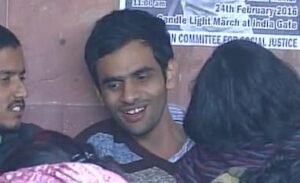On Tuesday, May 28, a Delhi court rejected the bail plea of former Jawaharlal Nehru University (JNU) scholar and activist Umar Khalid in connection with the 2020 Delhi riots conspiracy case. Additional Sessions Judge Sameer Bajpai of the Karkardooma Courts dismissed Khalid’s plea. The detailed order is awaited.
Umar Khalid Case Background 
Umar Khalid was arrested on September 13, 2020, in relation to the communal riots that erupted in northeast Delhi in February 2020. These riots followed clashes between supporters and protesters of the Citizenship (Amendment) Act (CAA), 2019, resulting in numerous casualties and injuries. Umar Khalid has been charged under the Unlawful Activities (Prevention) Act (UAPA), alongside accusations of criminal conspiracy, rioting, and unlawful assembly.
Umar Khalid’s legal battle has been ongoing for over three years. Initially, the trial court denied him bail in March 2022. This decision was upheld by the Delhi High Court in October 2022, prompting Khalid to appeal to the Supreme Court. On February 14, 2024, Umar Khalid’s counsel, Senior Advocate Kapil Sibal, withdrew his bail plea from the Supreme Court, citing a “change in circumstances” and decided to approach the trial court again.
In his latest bail application under Section 437 of the Criminal Procedure Code (CrPC) and Section 43D(5) of the UAPA, Umar Khalid argued there was no prima facie case against him and highlighted the lack of direct evidence linking him to the violence. Senior Advocate Trideep Pais, representing Khalid, stated, “Even after three years of incarceration, we are at the same place arguing for bail.”
Pais emphasized that Umar Khalid’s name was mentioned in the conspiracy from the beginning, yet no material evidence supported the terrorism charges against him. He drew parallels with the cases of Devangana Kalita, Natasha Narwal, Asif Iqbal Tanha, and Ishrat Jahan, who were granted bail despite facing similar accusations.
Special Public Prosecutor Amit Prasad opposed Khalid’s bail, arguing that his involvement was part of a premeditated plan. Prasad stated, “The name of the accused appeared from the beginning till the culmination of the conspiracy.” He also highlighted Umar Khalid’s efforts to amplify his narrative through social media, saying, “Khalid had requested several ‘actors’ to ‘amplify’ the links and hashtags to influence public opinion and bail hearings.”

Umar Khalid, a prominent student leader, and activist, has a history of involvement in significant political movements. A former JNU student, Khalid first gained national attention during the 2016 sedition case against JNU students. He has been an outspoken critic of government policies, particularly those affecting minority communities.
In a previous ruling, ASJ Amitabh Rawat of Karkardooma Court noted, “Khalid’s name was consistently mentioned from the inception of the conspiracy until the riots occurred, and there were multiple statements from witnesses providing ‘incriminating material’ against him.” Khalid contested this order at the Delhi High Court, which also denied him bail.
With the trial court’s recent decision, Umar Khalid’s legal team plans to appeal to the Delhi High Court once again. “We will continue to fight for justice,” Khalid’s counsel stated. The ongoing legal proceedings are set to further scrutinize the evidence and charges against him.
Umar Khalid remains in jail, with his legal battle far from over. Umar Khalid’s case will likely remain a focal point in discussions about justice, activism, and the legal system in India.
Case Chronology:
- September 13, 2020: Umar Khalid arrested.
- March 2022: Trial court denies bail.
- October 2022: Delhi High Court upholds bail denial.
- February 14, 2024: Supreme Court bail plea withdrawn.
- May 28, 2024: Trial court denies bail again.
Accusations and Charges:
- UAPA Sections: 13, 16, 17, 18
- Arms Act Sections: 25, 27
- Prevention of Damage to Public Property Act: Sections 3, 4











